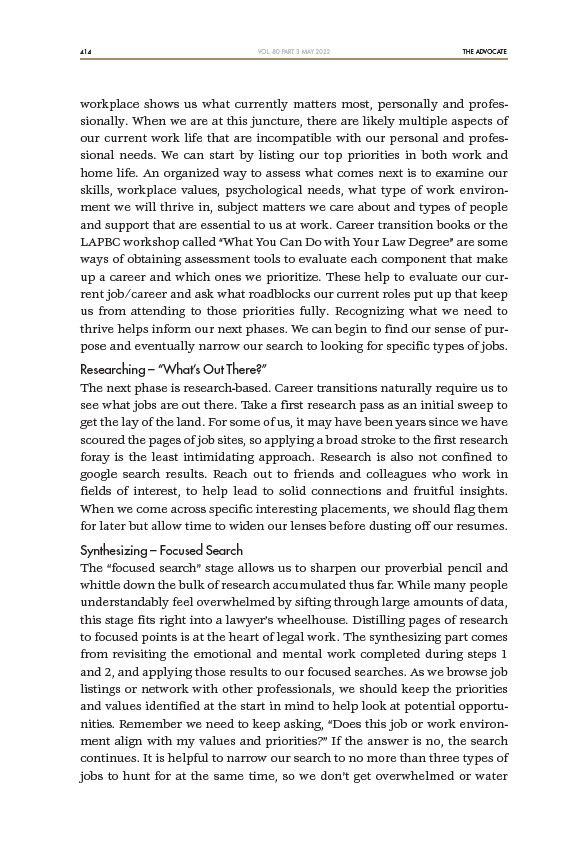
414 THE ADVOCATE
VOL. 80 PART 3 MAY 2022
workplace shows us what currently matters most, personally and professionally.
When we are at this juncture, there are likely multiple aspects of
our current work life that are incompatible with our personal and professional
needs. We can start by listing our top priorities in both work and
home life. An organized way to assess what comes next is to examine our
skills, workplace values, psychological needs, what type of work environment
we will thrive in, subject matters we care about and types of people
and support that are essential to us at work. Career transition books or the
LAPBC workshop called “What You Can Do with Your Law Degree” are some
ways of obtaining assessment tools to evaluate each component that make
up a career and which ones we prioritize. These help to evaluate our current
job/career and ask what roadblocks our current roles put up that keep
us from attending to those priorities fully. Recognizing what we need to
thrive helps inform our next phases. We can begin to find our sense of purpose
and eventually narrow our search to looking for specific types of jobs.
Researching – “What’s Out There?”
The next phase is research-based. Career transitions naturally require us to
see what jobs are out there. Take a first research pass as an initial sweep to
get the lay of the land. For some of us, it may have been years since we have
scoured the pages of job sites, so applying a broad stroke to the first research
foray is the least intimidating approach. Research is also not confined to
google search results. Reach out to friends and colleagues who work in
fields of interest, to help lead to solid connections and fruitful insights.
When we come across specific interesting placements, we should flag them
for later but allow time to widen our lenses before dusting off our resumes.
Synthesizing – Focused Search
The “focused search” stage allows us to sharpen our proverbial pencil and
whittle down the bulk of research accumulated thus far. While many people
understandably feel overwhelmed by sifting through large amounts of data,
this stage fits right into a lawyer’s wheelhouse. Distilling pages of research
to focused points is at the heart of legal work. The synthesizing part comes
from revisiting the emotional and mental work completed during steps 1
and 2, and applying those results to our focused searches. As we browse job
listings or network with other professionals, we should keep the priorities
and values identified at the start in mind to help look at potential opportunities.
Remember we need to keep asking, “Does this job or work environment
align with my values and priorities?” If the answer is no, the search
continues. It is helpful to narrow our search to no more than three types of
jobs to hunt for at the same time, so we don’t get overwhelmed or water